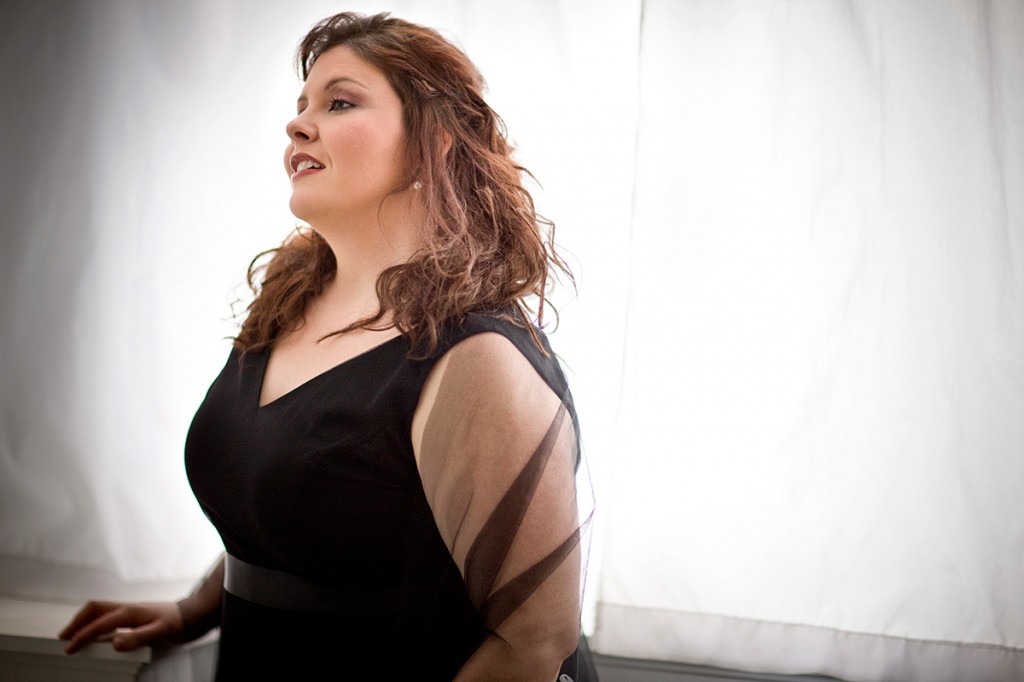Caramoor Festival serves up bel canto rarity with Donizetti’s “Lucrezia Borgia”

Angela Meade performed the title role of Donizetti’s “Lucrezia Borgia” Saturday night at the Caramoor Festival.
Donizetti’s Lucrezia Borgia is one of the composer’s strongest works. It consistently delivers the dramatic goods, doesn’t stint on memorable tunes, and its propulsive pacing allows for few longueurs.
Why, then, is it performed so rarely in New York? The Metropolitan Opera never went near it after a single disastrous outing in 1904. Since then, it has usually been staged in New York in concert, memorably serving as Montserrat Caballe’s local debut in a Carnegie Hall performance in 1965 and again as a star vehicle for Renée Fleming with Opera Orchestra of New York, also at Carnegie Hall, in 2000.
This summer in the Venetian Theatre at the Caramoor Festival, it receives two semi-staged concert outings. On Saturday night, the festival presented the original 1833 version, and July 18 Donizetti’s revision of seven years later will be performed.
The first version ends with a florid dramatic scena for soprano backed by the chorus, as was more or less de riguer at that time; for the second, Donizetti took the more daring step—soon to be emulated by Verdi at the conclusion of Rigoletto—of ending the opera with a duet for the title character and her dying son.
Will Crutchfield, director of Bel Canto at Caramoor, has programmed Rigoletto for July 19th; his aim is to show the similarities between these two works. Both were based on plays by Victor Hugo, and both conclude with a parent being indirectly responsible for the death of a beloved child. Additionally, one can easily trace the older composer’s influences on the younger by hearing the two operas in succession. As always, Crutchfield has put a great deal of thought into his programming.
Lucrezia Borgia may bear only the most tangential relation to historical fact, but its perverse libretto (by Felice Romani) is ideal opera material. The Borgias of Ferrara are pitted, Capulet-and-Montague style, against the Grimani family of Venice. Lucrezia, wedded to the jealous Duke of Ferrara, knows that her illegitimate son Gennaro is part of the rival Grimani faction, but her husband thinks the young man is Lucrezia’s lover. Ulitmately Gennaro ends up poisoned, with his mother sobbing over his body.
Crutchfield chooses his soloists with great care, and the Lucrezia Borgia cast is up to his usual very high standard. Angela Meade’s commanding temperament, declamatory power, and wide vocal range were ideal for the title role; as a soprano drammatico d’agilita she effortlessly executed Donizetti’s demanding ornamentation. The most stunning moment of many in her performance was when she held a mezza-voce note for bars and bars over the chorus, ultimately swelling it and holding it even longer at full, sustained force, all without any audible pause for breath. The Met would be wise to mount this opera for her.
As her son Gennaro, tenor Michele Angelini delivered on the promise he showed at Bard College Summerscape’s 2012 Le Roi malgré lui. His light, sweet tenor flows like honey, yet is fully up to the dramatic requirements of his hotheaded character. A stage director (none was credited) might have helped rein in a certain physical awkwardness in his demeanor; one suspects that this would have been less of a problem in a fully staged and costumed performance.
Christophoros Stamboglis’s rough-grained bass was an appropriately big and threatening sound; he offered little in the way of vocal elegance, but that is less of a priority in this thinly-drawn, vengeful role. As his henchman Rustighello, tenor Cameron Schutza wielded a similar full-bore approach. In the trouser role of Maffio Orsini, who has the opera’s best-known number–the drinking song “Il segreto d’esser felice”—mezzo Tamara Mumford gave a winning performance. Tall and striking, she has a highly individual mezzo timbre which is not always beautiful but that seizes the ear with its plush core. She need to tone down a tremulous vibrato, which verges on excessive, but that vibrato aided her in negotiating the trills and ornaments in her part. In smaller roles, tenor SungWook Kim and bass-baritone Joseph Charles Beutel stood out enough to make one want to hear more of them.
Crutchfield once again did a masterful job, not only in conducting the Orchestra of St. Luke’s and the Caramoor Festival chorus, but in maintaining an ideal balance among these forces and his soloists in the Venetian Theatre’s natural acoustics. (The visible microphones and speakers were only for the purposes of broadcasts, and recording; those who missed this performance will be able to hear it on WQXR on November 8 and it will be distributed nationally by the WFMT Network.)
Lucrezia Borgia will be performed in the revised 1840 version 8 p.m. Friday night. caramoor.org